- Home
- Jean Stone
Three Times a Charm Page 2
Three Times a Charm Read online
Page 2
She looked back now at the charred ashes of warm fires once shared. She thought of New Year’s celebrations when she’d been a girl: fireworks, in the white man’s way, tempered by the knowing that their real celebration for a “new” year would come with the first new moon of spring, when the grass would start to grow and hopeful spirits would be renewed.
Tradition, Sarah thought, needed people to nurture it.
And then the phone rang.
“Mom?”
Her heartbeat skipped. “Are you okay, honey?”
“Mom! I’m in Times Square! I saw the ball drop!”
The white noise of real-time celebration jarred the reception on the phone. “You’re in Times Square? Where is your father?”
“Dad’s playing somewhere. I came with my friend Glen and his mother. It’s a blast, Mom. It was so cool.”
She toyed with the cord of her old-fashioned telephone, a symbol of her old-fashioned ways. Her son no longer needed to pretend he was in London. He no longer needed to try to stay up watching television. He was right there at the source of all the fun, right there, not needing her. “Hey, that’s great, honey,” she said. “I’m glad you had a good time.”
“I gotta go, Mom. Happy New Year!”
He clicked off his end of the call and she sat, bewildered, staring into the hollow fireplace, listening to the solitude again, wondering what Glisi would have to say about it all.
3
Brunch.
Sleigh rides.
Snowshoeing.
Cross-country skiing lessons.
An early supper of chowders and crusty breads for the hangers-on, the wedding guests who had not gone home.
“Stay as long as you like,” Irene had instructed the couple’s friends, and John had added jokingly, “But after New Year’s Day, you’ll be footing your own bills.”
The Second Chances team had been assigned to keep everyone pleasantly amused until then.
Sarah returned to the Stone Castle on New Year’s morning. The media, thank God, had already left. As had John and Irene, for their wedding trip to Rio.
Though she was hardly needed—her job had been the decor, the theme, the visual magic for the ceremony and reception—Sarah went into the kitchen, searching for a menial task or two. Something to keep busy, to stave off unwelcome demons of too much aloneness. She had never been one to languish in a world of sorrow and self-pity. Glisi had trained her otherwise.
Elaine was in the kitchen, slicing orange wedges. Lily would hardly be awake by now, and Jo—what had become of Jo last night, anyway?
“Hey, partner,” Sarah said with forced but, she presumed, convincing cheer. “You’re up and at ’em early.”
“Brunch in twenty minutes,” Elaine replied with a wide and happy grin. “Here,” she said, handing over a colander of cranberries. “I’ll cut the oranges, you arrange them with cranberries and a sprig of mint on every plate.”
Sarah turned to the long stainless counter on which dozens of plates had been neatly aligned. “Well, this has sure put you in a good mood,” she said. “You did a wonderful job yesterday, Elaine. You proved to everyone that you’re a formidable caterer. And you proved it to yourself.” The wedding had been Elaine’s first attempt at showcasing her culinary talents, which had been passed down from her father.
Elaine smiled. “Three cranberries per plate, don’t you think?”
Sarah set down the colander and washed her hands. “Most people might acknowledge such a compliment with a simple ‘thank you.’ ”
Elaine adjusted the tie of her crisp new kitchen apron. “I know,” she said. “Thanks. But our success isn’t the only reason why I feel great today.”
Glisi’s training notwithstanding, it was hard right now to think that Elaine or anyone might actually be happy, to think that Sarah might be required to act as if she were delighted for her friend’s good mood, when what Sarah really wanted was to crawl into a deep, dark hole of misery and have her friends be down there too. She dried her hands, picked up the colander, and began to plunk three cranberries on every plate.
“Okay, I’ll bite,” she said. “Why the big fat smile?”
Elaine laughed. “Well, if you insist. I saw Martin last night after I left here.”
Martin? Martin was the man Elaine was supposed to have married. Sarah, Lily, and Jo were supposed to have been her bridesmaids. The wedding-in-the-making had been the catalyst for them to open Second Chances, to create a specialty, one-stop shopping haven for advice and services for discerning, second-time brides. Elaine had broken her engagement after the business was under way, but by then they’d already done so much and spent so much of Lily’s money that they’d said what the heck and plowed forward anyway, never dreaming of the success they’d reach in just a few short months.
“Martin, as in Martin-your-formerly-intended?”
Elaine chop-chopped another orange with Ginsu choreography. “The same,” she said, and Sarah figured she should ask for details, but she really was too tired, too preoccupied with her own tenuous issues, so she just said, “Well.”
Just then the kitchen door swung open and Jo was standing there.
Sarah remembered seeing Jo last night, standing beneath the stairs with Andrew. She had not seen her since. And now here she was, wearing last night’s dress.
Oh, Sarah thought.
Jo and Andrew.
Well.
She counted out three more cranberries and wondered if she should have stayed home with her dog.
The world is changing faster than most of us can notice, Andrew typed onto his laptop later that night. Real women are changing before my eyes; so, too, are real men. Second weddings (and third, I’m told) are becoming commonplace, causes for ostentatious celebration (“So divine!” my friend Olivia exclaims).
My parents’ generation would not have understood. He pushed away an image of his physician parents in their plain gray suits and gold wire-rimmed glasses and their predictable cheek kisses when one or the other came or went from the same apartment where they had lived since they’d been married and had died fifty-some years later. It wasn’t that they loved or didn’t love each other; divorce simply wouldn’t have occurred to them unless adultery or violence or lying was involved.
His own divorce had come because of Patty’s “indiscretions.” He wasn’t proud he’d known about them longer than he’d admitted.
Sitting up straight, he tried to focus on the laptop screen. His mind drifted a lot lately, since he’d fallen like a jerk, head over his Air Jordans in love with Jo. It was difficult sometimes not to compare the feelings with those that he’d once had for Patty. It was difficult not to be afraid.
He wondered if that was why his parents had stayed together, because the thought of going from one marriage to another had maybe been too frightening.
His fingers hung above the keyboard for another moment, then he resumed his task.
Second weddings stir up different feelings, richer stuff than first or “starter” (as I now hear people call them) weddings. The bride and groom, after all, are older. Wiser. More mature. Or at least they’re supposed to be.
He smiled as he reread his words. It was a risk, he knew, to mention second weddings so blatantly. Surely some hotshot reader of Buzz magazine would make the connection between this column and the recent press about John Benson’s extravaganza. John Benson, who just happened to be the editor and publisher of the upmarket rag.
Then Andrew laughed for thinking anyone might give a crap about his life or what he did or didn’t do. Still, he might as well stick to the pseudonyms he’d created for the women: Jacquelin, Sadie, Eileen, and dear Olivia, aka Lily.
Not that any of it really mattered now, because the time had finally come.
With quick, sure fingers, Andrew added: So the world has changed. I have too. When I first began this column, I did it almost on a dare. “How well do you think you understand women?” John Benson had asked. He’d been a friend for many
years. He’d been my mentor once.
John would enjoy seeing those words in print. In spite of being over sixty now and having spent several decades as a viable, visible contender in the industry, John (and his ego) still liked to ferret out his name in print, liked to hear it spoken in any of the broadcast media.
Well, Andrew continued, whatever I thought I understood about women, I’ve realized I was wrong.
I used to think we were so different, so Mars-and-Venus different, so yin and yang. I thought if we were too much the same that life would be too boring, that living would be dull.
I am happy to report that is not the case.
It may seem sometimes that we—men and women—are of a different species. But I have learned we want the same things—happiness, contentment, respect. Another person we can share our life and love with.
Then he sucked in a short breath and typed: And so this is my final column.
A slow grin crept around the corners of his mouth. He pictured Jo the first day she walked into Second Chances, her soft smile turning to surprise when she noticed a male receptionist. He pictured her when they’d rowed the boat across Laurel Lake and she’d dived into the water in her underwear. He pictured the way her green eyes sparked with laughter when the four women were together, laughing, joking, being friends.
The others, he knew, would always be part of Jo’s life. And now they’d be part of his life too.
He was glad he had at last come forward with the truth.
It’s been a fun adventure, he concluded, this research into what women think, how they feel, what they want. My findings were unexpected. Especially when I fell in love.
He smiled again.
In love? He typed.
Yes! With one of my subjects!
Disaster for a journalist!
I can’t, however, help myself. And I won’t say which of the women stole my heart. After all, what fun would there be in that?
Andrew smiled as he signed his now-famous AK to the end of the column. In the morning he would e-mail this farewell column to the editorial department at Buzz magazine. He had toyed with the idea of revealing his true identity to his readers, of letting them know that the undercover columnist was formerly Andrew David, television journalist who’d been seen around the world, who’d been married to the even more famous international cover girl Patty O’Shay, who’d traded everything for peace and quiet and a simple life in the Berkshire hills of Massachusetts with his terrific daughter, Cassie, who was fast asleep upstairs.
He could have said who he really was and bumped his credibility up a self-important notch. But there would have been no fun in that either.
He turned off his laptop, sat back in his chair, and let his mind wander into thinking that he’d see Jo tomorrow, that he’d be having dinner with her—and with Cassie—over at Jo’s house.
Suddenly the only problem Andrew seemed to have was where they’d live once he proposed. He sure would hate to leave his little cottage and the lumpy couches in the living room and the slanted timbered ceiling that he often whacked his head against and the scraggly vegetable garden out in the backyard that he’d come to love so much.
Andrew.
Jo lay awake in what had been her mother’s bedroom, the home where first mother then daughter had been raised. She stared at the shadows that played across the ceiling, whispering his name into the empty night.
She pulled the comforter closer against her body, trying to feel his warmth again, trying to re-create the wonder she had felt while lying next to him, not sleeping, really, just lingering in that postlove place of heaven, where all things were euphoric and fear did not exist.
Andrew.
She tried not to think about what would happen next, about whether last night had been a fluke, a coming together because of the joy, the wonder, the excitement that had surrounded them, a glamorous wedding, of all things. A rewedding of two people for whom Andrew cared a great deal.
Had their encounter only been a result of the mood?
She hadn’t seen him since he left their castle bed early in the morning. She’d regretfully gone home, showered, and changed into jeans and an old, comfortable sweater, then returned to the Stone Castle, where she helped the others get through the festivities of the day. Andrew wasn’t there. He’d said he’d be staying home with Cassie, that they always watched the football games on New Year’s Day, eating popcorn, drinking egg creams, the kind of egg creams he’d grown up on, the kind made in the city.
New York City.
She closed her eyes to the shadows.
They’d had such different upbringings. He was a city, penthouse boy; she, a small-town, clapboard-house girl. Though she’d lived in Boston many years, West Hope still was home for Jo. For Andrew, it was where he landed when he’d needed an escape.
He was the son of doctors.
She, the daughter of a clerk at the town hall and a construction-working man who’d left when Jo was nine.
He had tasted the sweet, beguiling fruit of being a celebrity, of being recognized, respected, always waited on.
She had scrambled for what few rewards she’d won then lost.
They were so different, weren’t they?
Could anything between them really ever work?
She turned onto her side, pulling the comforter too far from the bed. A cloud of cool air slapped her skin. She shuddered in the darkness, wrapped the comforter more tightly, and wondered if she’d ever sleep as peacefully as she had slept with Andrew by her side.
4
The second of January finally arrived. Sarah went into the shop early; there would be lots and lots to do, now that Second Chances was in demand. Lots and lots, she repeated to herself. The distraction would be as welcoming as hot tea in the afternoon.
She spent the morning in the backroom studio, cleaning and reorganizing in the Benson aftermath. The sounds of Jo and Andrew cloud-nine-ing through the morning (disguised as work-related noises—they didn’t seem to want to unveil the obvious new path of their relationship) were somehow tolerable today; Lily’s perky giggle and her frequent boyfriend ( yes, she had one, too) chatter about Frank-this and Frank-that were not even annoying. Let them all be happy if that was what they wanted. As for Sarah, she didn’t need that drivel. She had work to do!
At noon, the other happy one, Elaine, came into the backroom from next door where she’d been directing renovations. The Forbes Antiques Shop—“Frank’s little workplace,” Lily called it—was being transformed into McNulty’s Catering, a division of Second Chances. In addition to being Lily’s boyfriend, Frank was their landlord. He was now moving his wares though not his love life across the town common, into what had once been West Hope’s town hall.
Elaine toted a large cooler. “Jo said we need to have a working lunch. I brought asparagus salad, corn chowder, and potatoes lyonnaise from the wedding.”
A mismatched group of leftovers, Sarah deduced. Not unlike the women—and the man—of Second Chances.
“Sounds perfect,” Sarah said, stacking the last of her Benson drawings of silver sleighs, twinkling trees, and giant snowballs of angel hair, and sliding them into one of the wide, shallow drawers in a tall oak cabinet. She would no doubt use and reuse the creations for other weddings, with variations here and there.
“Sarah,” Elaine said, setting the cooler on the floor, “are you okay?”
She shrugged. “Sure.” She shut the drawer, rearranged the carousel of Magic Markers and pastel crayons on top of the cabinet. She preferred the old ways to the computer drawings of today; she felt she was more creative when it was the movement of her hand, not an acrylic mouse, that relayed her concepts onto paper.
“I meant because of Jason being gone,” Elaine continued. “And Burch.”
Sarah made a conscious effort not to jam a Magic Marker into its slot on the carousel, not to yank open another drawer for the follow-up potential of slamming it shut. “I’m fine,” she said. Long ago, she’d learned that
the less anyone knew about what was inside your true heart, the easier it was to live from day to day, the easier to survive from year to year.
But Elaine’s eyes lingered too long on her. She’d always been able to do that, to stare without expression, to pause without a blink, as if to read the other person’s mind. Her conclusions weren’t always right, but she seemed to like the effort to connect. “You never tell us what you’re thinking or how you feel,” Elaine finally said. “I guess it’s one of your secretive Indian ways. No offense.”
Sarah laughed and said, “None taken,” grateful that was the only deduction her friend had made. Then she said, “Let’s eat,” before Elaine—armchair psychologist, mother of three, once homemaker and caretaker—forgot that she now was a career woman and should not be wasting time on things as mundane as emotions.
“We have seventeen requests for second weddings in April alone,” Jo remarked. Her shoulders slumped. “Not to mention Valentine’s Day. We have to figure out which ones we can handle.”
Sarah surveyed the group that sat clustered in the navy chairs in the “conversation” area—the space that she’d designed to help make the brides and their grooms or their best friends or whomever as comfortable as possible during the second-wedding planning process. Instead of magazines and sketches, the cocktail table held lunch dishes and coffee mugs and files with Jo’s notes. Jo was their organizer, their sensible, natural-born group leader, the CEO of their amalgamated friendship. Not that she’d ever asked for such a dubious position: No matter what the four women had done over the years, Jo ended up in charge. Even when Lily railroaded them into one of her silly schemes, Jo was the one who inevitably made sense of it all.
“Well, we certainly can’t handle every request,” Lily said. “We’ll have to be selective.”
“First come, first served,” Sarah said.
“No!” Lily cried. “Let’s only do the ones we’ll have the most fun with.”

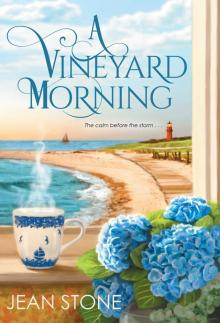 A Vineyard Morning
A Vineyard Morning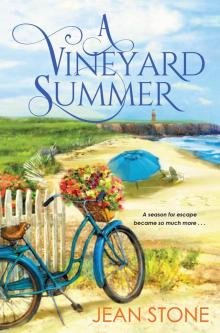 A Vineyard Summer
A Vineyard Summer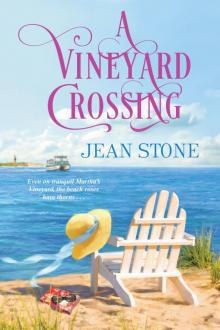 A Vineyard Crossing
A Vineyard Crossing A Vineyard Christmas
A Vineyard Christmas Beach Roses
Beach Roses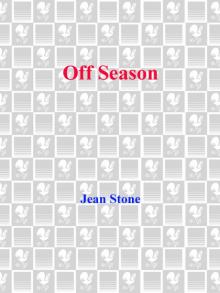 Off Season
Off Season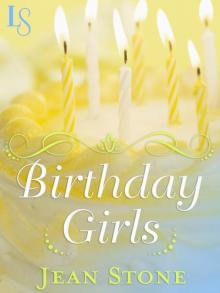 Birthday Girls
Birthday Girls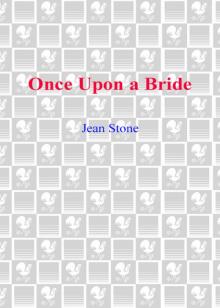 Once Upon a Bride
Once Upon a Bride Places by the Sea
Places by the Sea Trust Fund Babies
Trust Fund Babies The Summer House
The Summer House Tides of the Heart
Tides of the Heart Sins of Innocence
Sins of Innocence Four Steps to the Altar
Four Steps to the Altar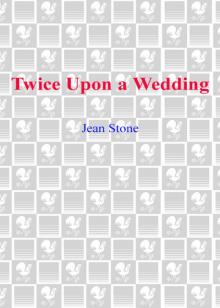 Twice Upon a Wedding
Twice Upon a Wedding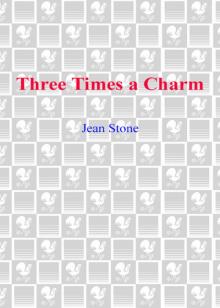 Three Times a Charm
Three Times a Charm